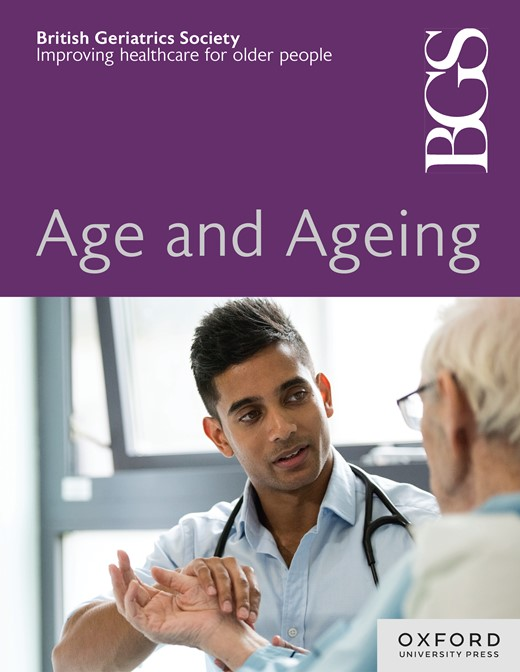Validation of the standard assessment of global everyday activities (SAGEA) scale for dementia diagnosis
IF 6
2区 医学
Q1 GERIATRICS & GERONTOLOGY
引用次数: 0
Abstract
Background Standardised questionnaires of cognitive symptoms and cognitive-related function can assist in diagnosing dementia. The Standardised Assessment of Global Everyday Activities (SAGEA) is a 15-item questionnaire, developed to measure functional status by capturing cognitive symptoms, basic and instrumental activities of daily living, participation in activites, and mobility. Objective The aim of this study was to validate the SAGEA as a tool for assessing cognitive dysfunction in dementia. Methods Participants with dementia, mild cognitive impairment (MCI) or subjective cognitive decline (SCD) were selected from the clinic-based Prospective Registry for Persons with Memory Symptoms (PROMPT), and cognitively asymptomatic, unimpaired controls were selected from the Canadian Platform for Research Online to Investigate Health, Quality of Life, Cognition, Behaviour, Function and Caregiving in Ageing study. Results SAGEA scores correlated well with the Lawton-Brody scale for instrumental activities of daily living (r = −0.68, P < 0.0001). SAGEA scores differed significantly across participant groups, highest for individuals with dementia (17.7 ± 8.59) followed by MCI (10.8 ± 9.10), SCD (8.07 ± 7.06) and controls (1.60 ± 2.07). The SAGEA classified dementia with an AUC of 0.97, sensitivity of 94.5% and specificity of 94.6% at a cut-off point of ≥6 points based on Youden’s index. A dementia diagnosis algorithm based on the SAGEA distinguished dementia from controls with a sensitivity of 68% and specificity of 100%. Conclusions This study supports the utility of the SAGEA as an adjunct to diagnosing dementia and a potentially useful screening tool.全球日常活动标准评估(SAGEA)量表用于痴呆诊断的验证
认知症状和认知相关功能的标准化问卷可以帮助诊断痴呆。全球日常活动标准化评估(SAGEA)是一份包含15个项目的问卷,旨在通过捕捉认知症状、日常生活的基本和工具性活动、活动参与和流动性来衡量功能状态。目的本研究的目的是验证SAGEA作为评估痴呆患者认知功能障碍的工具。方法从临床前瞻性记忆症状登记(PROMPT)中选择痴呆、轻度认知障碍(MCI)或主观认知衰退(SCD)的参与者,从加拿大健康、生活质量、认知、行为、功能和老年护理研究在线研究平台中选择认知无症状、未受损的对照组。结果SAGEA得分与日常生活工具活动的Lawton-Brody量表相关良好(r = - 0.68, P <;0.0001)。SAGEA得分在参与者组间差异显著,痴呆患者最高(17.7±8.59),其次是轻度认知障碍(10.8±9.10),SCD(8.07±7.06)和对照组(1.60±2.07)。SAGEA以约登指数(Youden’s index)为分界点(cut point of cut point≥6)对痴呆进行分类,AUC为0.97,灵敏度为94.5%,特异性为94.6%。基于SAGEA的痴呆症诊断算法以68%的灵敏度和100%的特异性将痴呆症与对照组区分开来。结论:本研究支持SAGEA作为诊断痴呆的辅助工具和潜在有用的筛查工具的效用。
本文章由计算机程序翻译,如有差异,请以英文原文为准。
求助全文
约1分钟内获得全文
求助全文
来源期刊

Age and ageing
医学-老年医学
CiteScore
9.20
自引率
6.00%
发文量
796
审稿时长
4-8 weeks
期刊介绍:
Age and Ageing is an international journal publishing refereed original articles and commissioned reviews on geriatric medicine and gerontology. Its range includes research on ageing and clinical, epidemiological, and psychological aspects of later life.
 求助内容:
求助内容: 应助结果提醒方式:
应助结果提醒方式:


